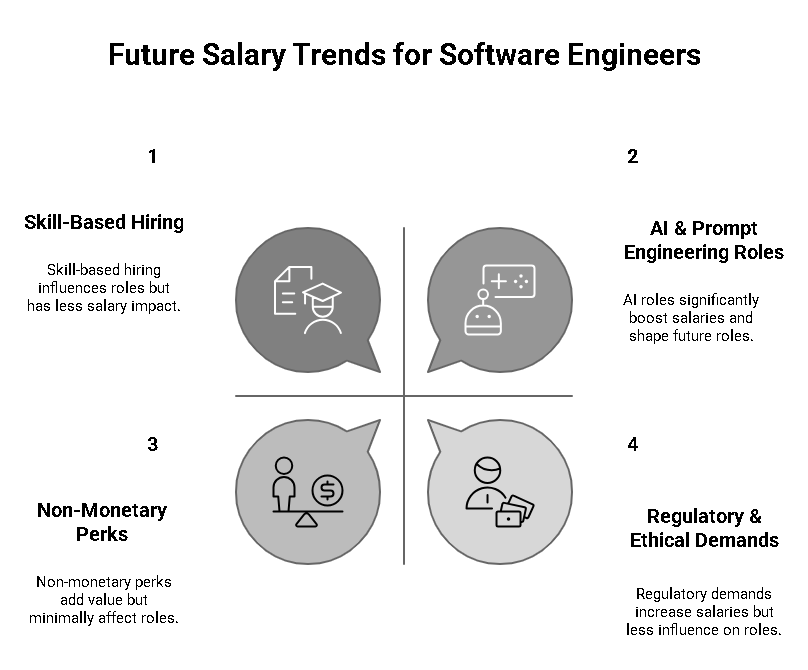Tech salaries often feel like a mystery—why do some software engineers earn two or three times more than others with the same degree? The truth is, paychecks rise where skill, demand, and business value meet. AI engineers are shaping automation, cybersecurity experts protect billion-dollar systems, and cloud architects keep entire companies running online.
In this article, we break down the highest-paying software engineering jobs, the skills that drive their salaries, and the industries hiring them. By the end, you’ll see exactly which paths lead to the biggest paychecks in 2025 and how you can start moving toward one today.
Understanding Software Engineering Salaries
Some software engineers bring home modest salaries, while others earn six figures or more. The difference isn’t random—it comes down to the value they bring to businesses and how their skills align with market needs. Let’s break it down.
Skillset and Specialization
Specialized skills command higher pay. For example, an engineer building AI-driven systems or securing sensitive data is solving problems that few people can handle. The rarer and more business-critical the skill, the higher the paycheck.
Experience Level
Paychecks usually rise with experience, but it’s more about impact than years worked. A mid-level engineer who can design entire systems might earn more than a senior engineer maintaining older code. Employers pay for problem-solvers, not just job titles.
Industry and Company Size
A startup might offer lower base pay but throw in stock options that could become valuable later. Big tech firms, fintech companies, and healthcare giants often pay top salaries because their work touches millions of lives—and dollars.
Geographic Location vs. Remote Opportunities
In the past, tech salaries peaked in cities like San Francisco or Seattle. Now, remote work levels the playing field. Skilled engineers in smaller cities—or even different countries—can earn Silicon Valley pay without living there.
Market Demand for Specific Technologies
Salaries spike when a technology becomes essential, but talent is scarce. AI, cloud computing, cybersecurity, and data engineering are prime examples right now. Where demand grows faster than the talent pool, salaries soar.
Highest-Paying Software Engineering Roles in 2025

Some software engineering roles consistently sit at the top of salary charts because they combine rare skills with high business impact. Let’s look at the roles leading the pack in 2025.
1. Machine Learning and AI Engineers
AI is reshaping industries—from self-driving cars to personalized healthcare—and companies pay top dollar for the engineers behind it.
- Average Pay: $140K–$200K+, with senior roles at FAANG and leading AI startups often crossing $250K including bonuses and stock options.
- Key Responsibilities:
- Building and deploying machine learning and deep learning models for real-time applications
- Training large language models (LLMs) and recommendation systems for enterprise use
- Optimizing AI pipelines for scalability, security, and cost efficiency
- Collaborating with data scientists and product teams to integrate AI into customer-facing products
- Top Skills: Python, TensorFlow, PyTorch, NLP, computer vision, MLOps, cloud platforms (AWS, GCP, Azure), data engineering fundamentals
- Career Growth Path: ML Engineer → Senior AI Engineer → AI Architect → Head of AI/ML or CTO
- Why It Pays Well:
- AI directly drives revenue through automation, analytics, and personalization.
- Demand for AI talent grows 35–40% annually, while the talent pool remains small.
- High-value industries like healthcare, finance, and e-commerce compete fiercely for top AI engineers.
- Pro Tip: Adding MLOps skills and experience with production-level AI systems often leads to faster promotions and better salaries.
2. Cloud Solutions Architects & DevOps Engineers
As businesses migrate to the cloud and rely on automated systems, these engineers design and maintain the backbone of modern technology. They keep systems scalable, reliable, and cost-effective—all while enabling faster product delivery.
- Average Pay: $130K–$185K, with senior roles at Fortune 500 companies and top tech firms reaching $200K–$220K+, including equity and bonuses.
- Key Responsibilities:
- Designing cloud architecture for scalability, security, and performance
- Automating infrastructure with Infrastructure as Code (IaC) tools like Terraform
- Managing CI/CD pipelines for smooth, frequent software releases
- Ensuring 24/7 system reliability and disaster recovery readiness
- Optimizing cloud costs while maintaining high availability
- Top Skills: AWS, Azure, Google Cloud, Kubernetes, Docker, Terraform, Ansible, CI/CD tools (Jenkins, GitLab), scripting (Python, Bash)
- Career Growth Path: DevOps Engineer → Senior Cloud Architect → Cloud Practice Lead → VP of Cloud Engineering or CTO
- Why It Pays Well:
- Downtime = lost revenue. These engineers ensure uptime and security for mission-critical apps.
- Companies save millions by using scalable, automated cloud solutions instead of physical data centers.
- The shift to hybrid and multi-cloud environments has made skilled architects even harder to find.
- Pro Tip: Earning certifications like AWS Certified Solutions Architect or Kubernetes Administrator significantly boosts job prospects and salaries.
3. Blockchain & Web3 Developers
Blockchain technology powers everything from decentralized finance (DeFi) to supply chain security and NFT marketplaces. Companies pay top salaries for engineers who can build secure, scalable, decentralized systems.
- Average Pay: $120K–$160K+, with niche roles in DeFi, NFT platforms, and Layer-2 solutions reaching $180K+, including tokens or equity.
- Key Responsibilities:
- Developing smart contracts for financial transactions, NFTs, and gaming platforms
- Building decentralized applications (dApps) that run on blockchain networks
- Ensuring security, scalability, and transaction speed for blockchain ecosystems
- Integrating blockchain solutions into enterprise systems for finance, healthcare, and logistics
- Top Skills: Solidity, Ethereum, Rust, Hyperledger, Web3.js, cryptography, smart contract auditing, Layer-2 scaling solutions (Polygon, Arbitrum)
- Career Growth Path: Smart Contract Developer → Blockchain Architect → Head of Web3 Engineering → CTO in Blockchain Startups
- Why It Pays Well:
- Blockchain use cases are expanding into finance, gaming, real estate, and supply chain.
- Talent is scarce—few engineers have deep knowledge of decentralized systems and cryptography.
- High-risk, high-reward projects often compensate with equity, tokens, or bonuses on top of salaries.
- Pro Tip: Learning smart contract auditing and Layer-2 scaling opens doors to top-paying enterprise and DeFi roles.
4. Cybersecurity Engineers
With cyberattacks costing companies millions each year, cybersecurity engineers have become the digital guardians of modern businesses. Their work keeps data, systems, and customer trust secure, making them indispensable—and highly paid.
- Average Pay: $120K–$175K+, with senior security architects and managers at top firms reaching $200K–$220K+ annually.
- Key Responsibilities:
- Designing secure networks, systems, and cloud environments
- Performing vulnerability assessments and penetration testing to find weak spots
- Monitoring security systems for real-time threat detection
- Implementing compliance standards like SOC 2, GDPR, and HIPAA
- Responding to breaches and creating incident response plans
- Top Skills: Ethical hacking, network security, cloud security, firewalls, SIEM tools (Splunk, QRadar), zero-trust architecture, identity & access management (IAM)
- Career Growth Path: Security Engineer → Security Architect → Director of Security → Chief Information Security Officer (CISO)
- Why It Pays Well:
- Data breaches can cost companies tens of millions—prevention saves far more than it costs.
- Demand surges as businesses move to cloud-first and remote-first operations, creating new security challenges.
- Regulations in finance, healthcare, and government require specialized security talent.
- Pro Tip: Certifications like CISSP, CEH (Certified Ethical Hacker), or CISM often lead to six-figure salaries and leadership opportunities.
5. Data Engineers & Big Data Specialists
Data fuels AI, analytics, and business decision-making, but raw data is messy and scattered. Big data specialists and data engineers build the systems that collect, clean, and deliver reliable data at scale—making them some of the most valuable engineers today.
- Average Pay: $110K–$160K+, with senior roles at analytics-driven companies and top tech firms exceeding $180K annually.
- Key Responsibilities:
- Designing and maintaining data pipelines for real-time and batch processing
- Building data warehouses and data lakes for analytics and AI models
- Ensuring data quality, consistency, and security across platforms
- Optimizing storage and processing for speed and cost efficiency
- Collaborating with data scientists and analysts to deliver actionable insights
- Top Skills: SQL, Python, Apache Spark, Hadoop, Kafka, Snowflake, AWS/GCP/Azure data tools, ETL/ELT pipelines, data modeling
- Career Growth Path: Data Engineer → Senior Data Engineer → Data Architect → Director of Data Engineering or Head of Data Platforms
- Why It Pays Well:
- Reliable data drives everything from AI development to customer analytics and product innovation.
- Demand spikes as companies collect massive amounts of unstructured data from IoT, social media, and cloud platforms.
- Few engineers master both data engineering and cloud-native technologies, creating a talent gap.
- Pro Tip: Learning streaming data tools like Kafka and cloud-native data platforms like Snowflake or BigQuery makes you stand out in a crowded market.
6. Full-Stack Developers at FAANG & Top Tech Firms
Full-stack developers bring end-to-end product expertise, handling both the front-end user experience and back-end systems that power applications. Their versatility makes them a go-to choice for startups and large tech firms alike—especially those moving fast with lean teams.
- Average Pay: $100K–$150K+, with roles at FAANG companies and high-growth startups reaching $170K–$190K+, including bonuses and equity.
- Key Responsibilities:
- Designing and building web and mobile applications from scratch
- Developing front-end interfaces using modern frameworks
- Building scalable back-end systems and integrating APIs
- Ensuring performance optimization and cross-platform compatibility
- Collaborating closely with design, product, and DevOps teams to deliver features quickly
- Top Skills: JavaScript/TypeScript, React, Node.js, Python, REST APIs, GraphQL, SQL/NoSQL databases, cloud deployment basics (AWS, GCP)
- Career Growth Path: Full-Stack Developer → Senior Developer → Engineering Manager → Director of Engineering or VP of Engineering
- Why It Pays Well:
- Companies save money by hiring one engineer who can handle multiple layers of development.
- Startups value full-stack talent for rapid product iterations without large engineering teams.
- Large firms pay top salaries for cross-functional engineers who can own features from concept to deployment.
- Pro Tip: Specializing in high-demand frameworks like React, Next.js, and cloud integration often leads to higher-paying roles at top companies.
Salary Comparison by Location & Industry
Software engineer salaries vary widely based on where you work and which industry you’re in. Location still matters, but remote work and industry specialization are changing the game in 2025.
Location-Based Insights
- United States Hotspots
- Silicon Valley & San Francisco: Highest salaries, often 20–30% above the national average. Senior engineers regularly cross $200K+ with equity.
- Seattle & New York City: Competitive pay driven by tech giants, fintech, and enterprise software companies.
- Austin & Boston: Growing hubs with slightly lower cost of living but strong salaries.
- Remote vs. On-Site Roles
- Remote salaries have closed much of the pay gap with tech hubs.
- Many companies now offer location-agnostic salaries for hard-to-find skills like AI, security, and cloud engineering.
- Global Comparisons
- Canada & Western Europe: Strong tech salaries but slightly lower than the U.S. due to market size.
- India & Southeast Asia: Salaries rising rapidly as remote hiring becomes more common for global teams.
- Emerging Tech Hubs: Countries like Poland, Vietnam, and Nigeria see growing demand with competitive remote pay.
Industry-Based Insights
- Fintech: Highest-paying industry for software engineers, especially in trading systems, blockchain, and AI-powered analytics.
- Healthcare & Biotech: Paying premium salaries for AI, data engineering, and cybersecurity to secure sensitive patient data and power medical research.
- E-Commerce & SaaS: Strong pay packages for full-stack, DevOps, and AI engineers driving personalization and logistics optimization.
- Aerospace & Defense: Niche engineering roles in embedded systems, cybersecurity, and simulation software often command six-figure salaries with added clearances.
Skills and Certifications That Boost Earnings
Technical skills and industry-recognized certifications often separate average earners from top earners in software engineering. In 2025, companies pay a premium for engineers who can deliver business impact quickly and stay ahead of technology shifts.
High-Demand Technical Skills
- AI & Machine Learning: Python, TensorFlow, PyTorch, NLP, computer vision, MLOps.
- Cloud & DevOps: AWS, Azure, GCP, Kubernetes, Terraform, CI/CD pipelines.
- Cybersecurity: Ethical hacking, cloud security, zero-trust architecture, SIEM tools.
- Data Engineering: Apache Spark, Hadoop, Snowflake, BigQuery, streaming data pipelines.
- Full-Stack Development: JavaScript/TypeScript, React, Node.js, Next.js, REST APIs, GraphQL.
Pro Tip: Combining AI or cloud expertise with cybersecurity creates rare, hybrid skills that companies pay top dollar for.
Industry-Valued Certifications
- Cloud Certifications: AWS Certified Solutions Architect, Microsoft Azure Architect, Google Cloud Professional Architect.
- AI & Data: TensorFlow Developer Certificate, Databricks Data Engineer, AWS Machine Learning Specialty.
- Cybersecurity: CISSP, Certified Ethical Hacker (CEH), CISM, CompTIA Security+.
- DevOps & Containers: Kubernetes Administrator (CKA), Docker Certified Associate, Terraform Associate.
- General Tech Leadership: PMP, ITIL, and Certified ScrumMaster for those moving toward management roles.
Pro Tip: Many companies offer salary boosts or promotions when engineers add high-value certifications to their skill set.
Soft Skills That Multiply Paychecks
- Communication: Explaining complex systems to non-technical stakeholders.
- Leadership: Leading cross-functional teams or managing projects.
- Problem-Solving: Quickly identifying bottlenecks and proposing solutions.
Career Growth Tips for Maximizing Salary
Landing a high-paying software engineering role isn’t just about learning a few tools—it’s about building the right skills, positioning yourself strategically, and seizing growth opportunities. Here’s how top earners do it:
1. Build a Strong Portfolio of Real Projects
- Employers value real-world impact more than resumes filled with buzzwords.
- Contribute to open-source projects, build personal apps, or showcase work on GitHub and LinkedIn.
- Case studies with measurable results (e.g., “Reduced system downtime by 40%”) make you stand out.
2. Master Salary Negotiation
- Research average salaries using platforms like Levels. Fyi and Glassdoor before interviews.
- Highlight unique skills and business impact rather than years of experience alone.
- Leverage multiple job offers when possible—companies pay more when they know you have options.
3. Network Strategically
- Attend tech conferences, join online developer communities, and participate in hackathons.
- Many high-paying roles are filled through referrals rather than job boards.
- Build relationships with recruiters at top companies early.
4. Stay Current with Emerging Tech
- Dedicate time each quarter to learn a new tool or trend—AI frameworks, cloud services, or security tools.
- Micro-certifications and online bootcamps keep skills fresh without long commitments.
5. Transition to Leadership Roles Over Time
- Senior engineers who move into Tech Lead, Engineering Manager, or CTO roles often see the largest salary jumps.
- Leadership requires team management and strategic decision-making skills, not just technical expertise.
Future Salary Trends for Software Engineers

These are trends likely to shape pay in software engineering over the next few years. Understanding them helps you pick roles, skills, and directions that’ll grow your earnings.
1. AI & Prompt Engineering Roles Will Drive Big Premiums
- Prompt engineers and specialists in fine-tuning large language models (LLMs) are seeing fast salary growth. Some roles already cross $200,000+ total compensation.
- Employers increasingly offer salary and bonus premiums for AI/ML skills—even for software roles that didn’t use to need them.
2. Skill-Based Hiring Gains Ground, Degree Less Central
- More companies are valuing skills, certifications, and demonstrable project work over formal degrees, especially for AI and data roles.
- Micro-credentials (online courses, bootcamps) in AI, cloud, security, etc., are becoming trusted signals of competence in hiring.
3. Non-Monetary Perks and Remote Work Add Value Beyond Base Pay
- Job roles with strong AI or ML components tend to include more perks: remote work, flexible hours, parental leave, and health/wellbeing benefits. These add real value beyond salary numbers.
- Remote work, already widespread, is likely to stay and reduce geographic pay gaps somewhat, especially for in-demand roles.
4. Regulatory & Ethical Demands Raise Salaries in Certain Sectors
- As AI systems impact privacy, fairness, and bias, sectors like healthcare, fintech, and government will pay more for engineers with security, compliance, and ethics expertise.
- Companies are investing in safe, explainable AI, and that means engineers who can build responsibly will be rewarded.
5. Rising Specialization & Hybrid Roles
- Roles combining multiple high-value skills—such as AI + cloud infrastructure, ML + security, or AI + automation—will earn more because they reduce hiring overhead and produce broader impact.
- Hybrid roles are on the rise (e.g., AI Ops, MLOps, Prompt Engineering + DevOps) and often come with premium pay.
6. Salary Inflation & Competition for Top Talent Will Keep Growing
- Salaries are already seeing boosts as companies compete for scarce skills. Some firms are offering massive sign-on bonuses and equity packages.
- Inflation and cost-of-living pressures in major tech hubs will continue pushing pay upward for senior engineers.
Conclusion
High-paying software engineering roles aren’t about luck—they’re the result of smart career choices and staying ahead of industry trends. Engineers who focus on in-demand skills like AI, cloud computing, cybersecurity, and data engineering consistently find themselves at the top of salary charts.
But specialization alone isn’t enough. Combining skills—like AI with cloud infrastructure or security with DevOps—often leads to hybrid roles that pay even more. Adding certifications and real-world project experience helps you stand out in a crowded market and opens doors to leadership positions.
Finally, don’t forget visibility and strategy. Build a public portfolio, network with industry peers, and negotiate based on solid salary data. The engineers earning the most in 2025 are the ones who keep learning, adapt quickly, and align their skills with what businesses value most.




